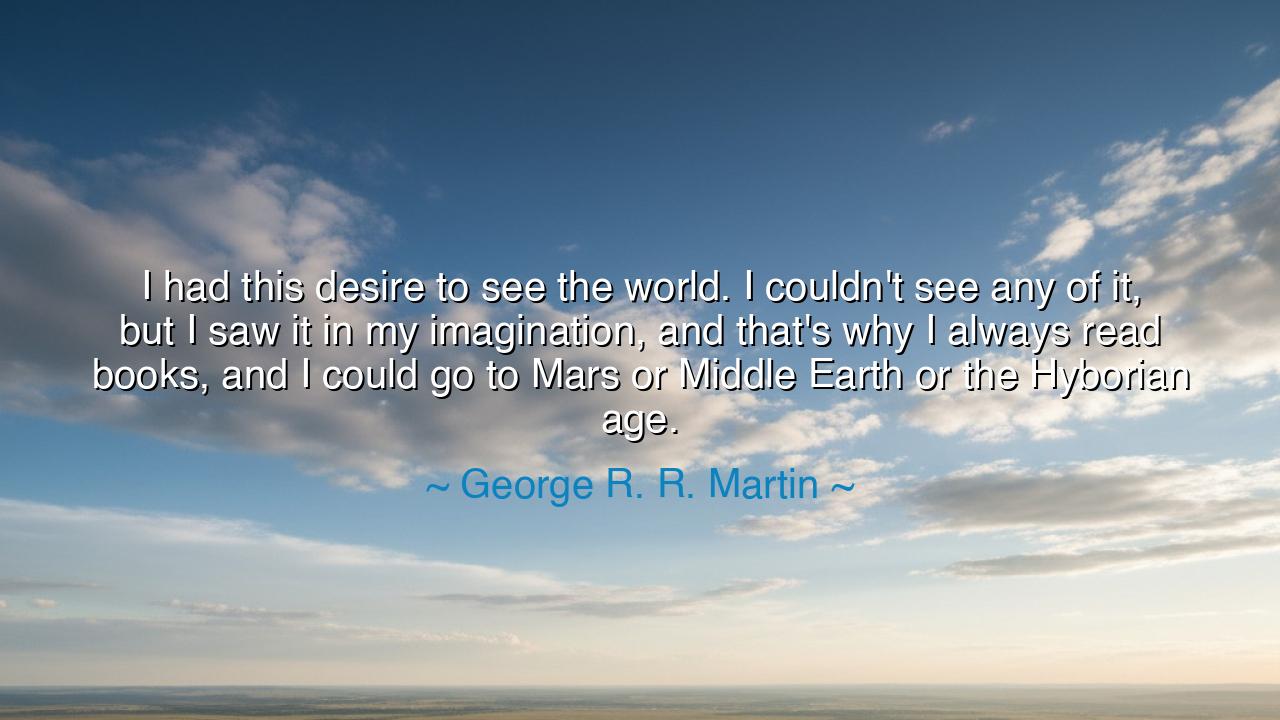
I had this desire to see the world. I couldn't see any of it, but
I had this desire to see the world. I couldn't see any of it, but I saw it in my imagination, and that's why I always read books, and I could go to Mars or Middle Earth or the Hyborian age.






“I had this desire to see the world. I couldn’t see any of it, but I saw it in my imagination, and that’s why I always read books, and I could go to Mars or Middle Earth or the Hyborian age,” said George R. R. Martin, the master storyteller who built entire kingdoms from words alone. In these simple but luminous lines, Martin reveals the secret of the imaginative spirit — that through books, one may travel further than any ship or airplane could ever carry, and through imagination, one may live a thousand lives though bound to a single body. His words are both confession and invitation — a glimpse into the heart of a dreamer who found freedom, not in the roads of the world, but in the realms of the mind.
Martin, born in the humble surroundings of Bayonne, New Jersey, grew up far from the grand castles, misty moors, and distant galaxies that would later populate his fiction. As a child of modest means, he could not see the world as the wealthy might — yet within him burned the same wanderlust that drives explorers to cross oceans. Instead of despair, he turned to imagination, that divine faculty which creates worlds within worlds. Books became his vessels, and through them he journeyed across time and space: to Mars, where he met the red winds of other suns; to Middle Earth, where courage and destiny walked hand in hand; and to the Hyborian age, where Conan’s sword gleamed beneath forgotten stars. Thus, what poverty denied him, imagination restored in abundance.
The ancients would have called this gift the inner sight, the vision of the soul that sees beyond the horizon. For not all travelers move their feet — some move their minds. Just as Homer, blind and frail, journeyed across the wine-dark seas through song, so too did Martin voyage through story. It is the paradox of art that those who seem most confined often see most widely. The imagination, when nourished by literature, becomes a chariot of fire — lifting the heart beyond the bounds of circumstance, granting to the small and unseen the grandeur of infinite worlds.
There is a lesson here for all who live within the limits of routine and reality. When Martin speaks of reading, he does not speak of escape, but of expansion. The reader who steps into another world does not flee this one — he returns with vision sharpened and heart enlarged. To read of heroism in other lands teaches us to be braver in our own; to glimpse sorrow in distant tales teaches us compassion for the stranger. Every book becomes both a mirror and a window — a reflection of our hidden selves, and a passage into the boundless human story.
History itself bears witness to this truth. Miguel de Cervantes, imprisoned in the dungeons of Algiers, penned Don Quixote, a tale that danced between madness and imagination. Though caged, his mind roamed free — and through his creation, the world discovered again the power of dreaming. Like Martin, Cervantes understood that to imagine is not to escape reality, but to recreate it, to give it deeper meaning. The body may be trapped, but the spirit that imagines cannot be chained.
Thus, Martin’s words remind us that imagination is not mere fancy — it is the lifeblood of civilization. Without it, there are no voyages, no inventions, no songs. Every discovery, every work of art, every act of faith begins first as a spark in the unseen mind. To read is to fan that spark; to imagine is to let it blaze. Through imagination, the lonely find company, the weary find wonder, and the small discover their vastness.
So, children of words and wanderers of thought, heed this wisdom: feed your imagination as you would feed your soul. Read not only for knowledge, but for awakening. When the world feels narrow, open a book, and you will find it infinite. Like Martin, see with the eyes of the spirit, not the eyes of the flesh. For though your body may stand still, your mind may stride across worlds yet unborn. And one day, perhaps, as Martin did, you too shall weave your own worlds — so that others may travel through the imagination you once called home.






AAdministratorAdministrator
Welcome, honored guests. Please leave a comment, we will respond soon